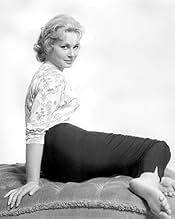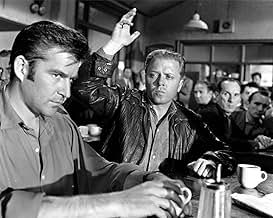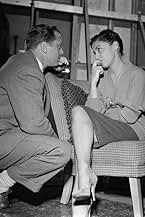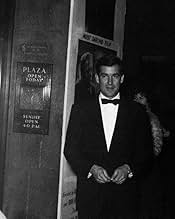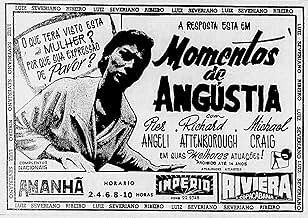PUNTUACIÓN EN IMDb
7,2/10
1,8 mil
TU PUNTUACIÓN
Añade un argumento en tu idiomaA young factory worker decides to stand up against his workmates and fellow union members when they want to hold a wildcat strike.A young factory worker decides to stand up against his workmates and fellow union members when they want to hold a wildcat strike.A young factory worker decides to stand up against his workmates and fellow union members when they want to hold a wildcat strike.
- Dirección
- Guión
- Reparto principal
- Nominado para 1 premio Óscar
- 6 premios y 6 nominaciones en total
Reseñas destacadas
Filmed in Ipswich, this screenplay, challenging in its time, gives a clear portrayal of British Industrial relations during the time 'We never had it so good.' Alfred Burke's agent provocateur with his sinister telephone calls does just enough to suggest that the cold war was blowing through British engineering. Attenborough's innocent at the power lathe is nicely offset by the underrated Michael Craig as his friend and lodger forced to go along with the Union's decision to send the strikebreaker to Coventry. Good location shooting and the knowledge that things were not so very different in reality makes this a handy movie from several perspectives. Viewed with 'I'm Alright Jack' you can gain a fair impression of Britain in the days of Black and White Television
Guy Green's (1960) film of Bryan Forbes' screenplay is based on a treatment by Michael Craig and, brother, Richard Gregson. Set in London in the late 1950's it was the first release of the joint venture production company Beaver Films set up by Bryan Forbes and Richard Attenborough.
As the film opens, we join Tom Curtis (Richard Attenborough) at work in a small engineering factory beset with labour problems. Single-minded and fiercely independent, Curtis is slow to grasp the implications of the fomenting unrest among his workmates as they band together to challenge the management head-on in a dispute that ultimately leaves Curtis out in the cold.
We follow Curtis home at night where his workmate Joe Wallis (Michael Craig - also writer) lodges with Curtis, his wife Anna (Pier Angeli) and their young family.
But as industrial relations deteriorate at work we see Curtis becoming increasingly isolated and intimidated by his determined colleagues.
With solid performances from Bernard Lee (Bert Connolly), Geoffrey Keen (Davis) and Alfred Burke (Travers) as the sinister agitator, the audience sees Curtis left high and dry as even the management feel compelled to abandon him.
Increasingly out of his depth, we are drawn into Curtis' worsening situation as his family are also intimidated in an effort to break his indomitable will.
This film captures something of the early struggle for recognition by employees in small firms like this before employment protection became enshrined in the law of the land. It gives us a feel for the situation of the casualties along the way and the forces at play.
As the film opens, we join Tom Curtis (Richard Attenborough) at work in a small engineering factory beset with labour problems. Single-minded and fiercely independent, Curtis is slow to grasp the implications of the fomenting unrest among his workmates as they band together to challenge the management head-on in a dispute that ultimately leaves Curtis out in the cold.
We follow Curtis home at night where his workmate Joe Wallis (Michael Craig - also writer) lodges with Curtis, his wife Anna (Pier Angeli) and their young family.
But as industrial relations deteriorate at work we see Curtis becoming increasingly isolated and intimidated by his determined colleagues.
With solid performances from Bernard Lee (Bert Connolly), Geoffrey Keen (Davis) and Alfred Burke (Travers) as the sinister agitator, the audience sees Curtis left high and dry as even the management feel compelled to abandon him.
Increasingly out of his depth, we are drawn into Curtis' worsening situation as his family are also intimidated in an effort to break his indomitable will.
This film captures something of the early struggle for recognition by employees in small firms like this before employment protection became enshrined in the law of the land. It gives us a feel for the situation of the casualties along the way and the forces at play.
I saw this film in my first year in law school in New York in 1991. A prior comment calls the film "right wing." Unfortunately, given the subsequent events in Britain in the 1970s and contemporary events in Detroit right now, it is prescient. Lord Attenborough's character faces a labor high noon many encounter in a union shop. One older worker in the film wants only to make a product that he is proud of. A pride that forces in the union movement obstruct. Anyone compelled to join a union by organizers who hire on only to unionize, will appreciate this film. I know. I've been there -- twice. White collar and blue collar jobs. That the film was made at all is amazing. But this often grim picture does have a comedic sibling -- the equally brilliant I'M ALL RIGHT JACK with Ian Carmichael and Peter Sellars. See both and you will understand what happened to Britain as well as too much of industrial America. If corporate greed has a partner, it is union executives who throw their members under a bus to save their jobs. THE ANGRY SILENCE should be required viewing for anyone who believes that political films -- not politicized films -- have a place in Hollywood. Heartbreaking story, economic direction, and brilliant acting. In dramatic black and white. The screenplay won a BAFTA Award for Bryan Forbes.
Though Richard Attenborough takes top billing in this drama, I think Bernard Lee actually delivers the more potent performance as the shop steward "Bert". He calls for an unofficial strike of the workers at an engineering plant. Out they go, well most of them do - and it is soon clear to the audience that there is an agitator amongst the workforce intent on using this dispute for a greater purpose. We also encounter a few local hoodlums who have few scruples when it comes to persecuting - violently at times - those few workers who cross their picket line and continue to work. "Curtis" (Attenborough) is one such man. He already has a young son, and his wife is expecting his second child - so money is too tight for him not to get a wage. Pretty soon he is the victim of a vendetta from his erstwhile colleagues as they ostracise him completely. Director Bryan Forbes and co-star Michael Craig ("Wallace") had a hand in the writing and that is powerful. It generates a genuine sense of menace as those daring to break the strike find their property and their physical safety compromised whilst their erstwhile friends struggle with their consciences. Brian Bedford also stands out as the thuggish "Barrett" and there is also a potent, if sparing, contribution from Pier Angeli as the young man's wife "Anna". Ordinarily, one might expect this story to be about the abuse of power by an employer; here, though, the abuses are clearly coming from those with a broader agenda quite capable of mobilising a workforce of political sheep. The ending is rather rushed - almost incomplete, unfortunately but the ensemble and the toic work really well here to create a thought-provoking piece of cinema that packs a lot into ninety minutes.
This brilliant, deeply contentious film has largely been ignored over the years. It came out just as 'the kitchen sink' was kicking in and, although dealing with the working class, was very much an establishment film. It's right-wing and anti-Union and it quickly became very unfashionable to think highly of it. But dramatically, it's first-rate; it has the feel of those good BBC 'Plays for today' that came out in the sixties even if does leave a very bad taste in the mouth.
It's about a man sent to coventry for not supporting an unofficial strike. He's played by Richard Attenborough and it's a great piece of acting. As written, the character isn't developed in dramatic terms but Attenborough is wonderfully naturalistic. It's an intuitive performance; he gets inside the character's skin and thought processes. He's very moving.
There is very fine work, too, from Pier Angeli as his Italian wife. (Angeli was probably brought in to sell the film in America, and there's an easy-going, unforced quality to her acting that is very 'un-British'). And Bernard Lee is excellent as the dictatorial shop steward. The film also has an unfortunate Mephistopolean character in the form of an infiltrator. He's evil and cowardly and used in such a blatantly metaphorical way you can't be sure exactly what his purpose is. And being a political, Union bashing film you may feel uneasy watching it. But there are very fine. sustained dramatic sequences, too and it is utterly unsentimental.
It's about a man sent to coventry for not supporting an unofficial strike. He's played by Richard Attenborough and it's a great piece of acting. As written, the character isn't developed in dramatic terms but Attenborough is wonderfully naturalistic. It's an intuitive performance; he gets inside the character's skin and thought processes. He's very moving.
There is very fine work, too, from Pier Angeli as his Italian wife. (Angeli was probably brought in to sell the film in America, and there's an easy-going, unforced quality to her acting that is very 'un-British'). And Bernard Lee is excellent as the dictatorial shop steward. The film also has an unfortunate Mephistopolean character in the form of an infiltrator. He's evil and cowardly and used in such a blatantly metaphorical way you can't be sure exactly what his purpose is. And being a political, Union bashing film you may feel uneasy watching it. But there are very fine. sustained dramatic sequences, too and it is utterly unsentimental.
¿Sabías que...?
- CuriosidadesThis movie was initially banned in certain parts of Wales, as several cinemas were controlled by the miners' unions at that time. It was only when Richard Attenborough personally intervened and screened it for the union leaders that the ban was revoked.
- PifiasThe girl lying on the grass with the motorcyclist is flat on her back on the grass then the shot changes and she has her head raised with her head using a tree trunk as a pillow.
- Citas
Tom Curtis: Shut up! Shut up will you! You don't have to worry about not talking to me. I don't want you to talk to me, do you hear? But you stay away from my family. Just stay away from us!
- ConexionesFeatured in Film Review: Richard Attenborough (1968)
Selecciones populares
Inicia sesión para calificar y añadir a tu lista para recibir recomendaciones personalizadas
- How long is The Angry Silence?Con tecnología de Alexa
Detalles
Taquilla
- Presupuesto
- 98.000 GBP (estimación)
- Duración1 hora 35 minutos
- Color
- Relación de aspecto
- 1.66 : 1
Contribuir a esta página
Sugerir un cambio o añadir el contenido que falta

Principal laguna de datos
By what name was El amargo silencio (1960) officially released in India in English?
Responde



